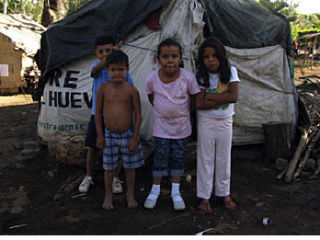Above, Nicaraguan children pose for the camera during the work day.
Below, right, the crew from Lopez Island digs into a local building project with gusto
Shoveling and pick-axing a giant hole side-by-side with Nicaraguan women and men. Making tortillas by hand on a wood-fired oven. Realizing that a board and scrap metal shack is a family’s home. Playing games with laughing, brown-eyed children. These and other experiences filled the days of Lopez High School students and adult community members on their recent 2-week trip to Nicaragua.
Thanks to the generosity and support of community members, parents, and the Lopez High School, this service trip has happened every other year since 2001. The trip gives Spanish language students a chance to practice their speaking and listening skills. Equally significant is the immersion into a culture vastly different from the students, and the chance to lend a hand to Nicaraguans working to build jobs for the future.
Nicaragua is a place of stunning beauty, a landscape dotted with active volcanoes, vast blue lakes, and spreading tropical trees. Cycles of oppression, revolution, and governmental corruption have left it one of the poorest countries in the western hemisphere. In the impoverished community where the Lopez group worked, unemployment stands at about 80% and most people live on less than $1 per day. This has created an economic free-for-all. Foreign-run factories (maquiladoras) are welcomed under policies destined to funnel all profits back out of the country, simply to provide low-wage jobs for some Nicaraguans. There is no economic niche too small to be occupied in this country. An appallingly large number of men, women and children actually live at the enormous Managua dump, combing the refuse for useable or saleable “goods”.
The Lopez travelers’ hosts were the Center for Development in Central America (CDCA), who are committed to breaking down this wall of poverty. In addition to hosting delegations like the ones from Lopez Island, they work with groups of locals to create worker-owned cooperatives. Agricultural co-ops help farmers growing organic coffee, sesame seed, and cotton find larger markets and better prices for their crops. On the grounds of the CDCA stands a worker-built sewing cooperative. Nearby in Nueva Vida, CDCA staff work alongside locals in a health clinic. This clinic was built with support from CDCA and Bucknell University. For 15 years of work in Nicaragua, the CDCA were chosen as finalists for the 2008 Opus Prize, an award given annually “to recognize unsung heroes who, guided by faith and an entrepreneurial spirit, are conquering the world’s most pressing social problems.”
The 2009 Lopez delegation helped with the next major building project: a spinning cooperative that will someday take raw organic cotton, ginned on site, and spin it into thread. The Lopez delegation sweated with their co-workers, laughed and sang with them, heard stories of their lives, and tried to imagine their courage and strength. Most have worked on this project for two years without pay in the hope of eventually creating jobs for themselves or their children. The connections with the ideals of many Lopez islanders with the Nicaraguan community were startling. These folks are committed to organic agriculture and to small-scale, sustainable, worker-owned manufacturing.
Inspired by what other groups have accomplished, the Lopez delegation dreams of creating a larger presence for the Lopez community in Nicaragua. In time, the Lopez travellers would like to send an adult delegation to the CDCA in 2010, an “off” year for the high school trip. Planning for this delegation is underway. Anyone interested in attending a gathering is invited to the Community Center at 7:00 p.m. on April 26 to learn more. Students recently returned from this year’s trip will share impressions, photos and crafts will be shown, and there will be time for questions and discussion. For more information, call Suzanne Strom at 468-4325.



